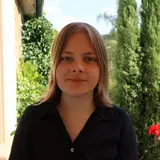Intelligent Medical Systems
- Imaging and Radiooncology

Prof. Dr. Lena Maier-Hein
Head of Division, Managing Director "Data Science and Digital Oncology"
Artificial intelligence (AI) is set to revolutionize various areas of everyday life. In healthcare, however, its integration into routine procedures and impact on patients are still limited. The mission of the Division of Intelligent Medical Systems is to tackle the unique challenges of medical imaging AI to generate lasting patient benefit. A particular focus of our research lies in the surgical application domain.

Our Research
Currently, patient outcome is heavily influenced by the surgical team's experience, with many potential complications being avoidable. To address such major socioeconomic problems and consistently elevate patient outcome beyond current standards, our multidisciplinary team works on intelligent medical systems in close collaboration with clinicians. Specific goals lie in the development of novel AI-enabled imaging techniques and trustworthy surgical AI systems that are ready for real-world clinical application. Key methodological challenges are related to the generalization of AI methods across devices, patient populations and hospitals, high data variability in an inherently sparse data regime, multimodal data integration, incorporation of prior knowledge into models, and the meaningful validation of AI systems under real-world clinical conditions.
Our Team Philosophy
Our division strongly believes in teamwork – not as an abstract ideal, but as a lived reality every day. Members of our division are involved in projects beside their own, making our group a strong network where everyone benefits from skills and talents that complement each other.
Our Team
- Show profile

Prof. Dr. Lena Maier-Hein
Head of Division, Managing Director "Data Science and Digital Oncology"
- Show profile

Dr. Alexander Seitel
Deputy Head of Division
- Show profile

Dr. Annika Reinke
Deputy Head of Division
- Show profile

Dr. Patrick Godau
Group lead
- Show profile

Carlos Aumente Maestro
- Show profile

Alexander Baumann
Ph.D Student
- Show profile

Christoph Julien Bender
Ph.D Student
-
Ann-Sophie Bienen
- Show profile

Leonie Boland
Ph.D Student
- Show profile

Dr. Evangelia Christodoulou
PostDoc
-
Laura de Riese
-
Max Finke
- Show profile

Prof. Dr. Alfred Franz
Scientist
- Show profile

Dr. Patrick Godau
Group lead
-
Maximilian Gutzmann
-
Pascal Hansen
- Show profile

Dr. Doreen Heckmann-Nötzel
Scientific Manager
- Show profile

Jakob Hennighausen
Scientist
- Show profile

Niklas Holzwarth
Ph.D Student
- Show profile
Katharina Härle
- Show profile

Marco Hübner
Ph.D Student
- Show profile

Dorina Ismaili
Master Student
- Show profile

Piotr Kalinowski
Ph.D Student
-
Anna-Lena Kammerer
-
Dr. Ali Emre Kavur
- Show profile

Marcel Knopp
Ph.D Student
- Show profile

Nina Kraft
Administration and Technical Support
- Show profile
Lennart Laqua
- Show profile

Lucas Luttner
Ph.D Student
-
Ines Machado
- Show profile

Prof. Dr. Lena Maier-Hein
Head of Division, Managing Director "Data Science and Digital Oncology"
- Show profile

Leon Mayer
Ph.D Student
- Show profile

Dominik Michael
Ph.D Student
-
Sejal Mutakekar
- Show profile

Klavdiia Naumova
Ph.D Student
- Show profile

Jan-Hinrich Nölke
Ph.D Student
- Show profile

Piermarco Pascale
Computer Scientist for System Integration
- Show profile

Berit Pauls
Ph.D Student
- Show profile

Xin Peng
Master Student
-
Sai Leela Poduru
-
Ahmad Qasim
-
Paul-Philipp Rechlin
- Show profile

Maike Rees
Ph.D Student
- Show profile

Dr. Annika Reinke
Deputy Head of Division
-
Elea Reischl
- Show profile

Tom Rix
Ph.D Student
- Show profile

Tim Rädsch
Ph.D Student
-
Saliq Neyaz Saliq Neyaz
-
Felix Schneider Segura
-
Silvia Seidlitz
- Show profile

Dr. Alexander Seitel
Deputy Head of Division
-
Dr. Jan Sellner
-
Vaishnavi Pramod Shirbhate
- Show profile

Dr. Minu Dietlinde Tizabi
PostDoc
- Show profile

Viet Tran Ba
Ph.D Student
-
Franz Wetzel
-
Sophie Widmann
-
Derin Özarslan
Interested in joining IMSY?
Are you interested in our research and would like to carry out a student research project, bachelor, master, or diploma thesis? Or would you like to write your PhD thesis in our division?
News
Please refer to the following channels to get the latest news of our division:
Awards
We are proud of the significant recognition we have achieved through various awards. These awards demonstrate the impact of our work on the scientific community and beyond.
Media
Our engagement with the scientific community and the public is reflected in a diverse range of activities, including seminars, invited talks, conference presentations, and broad media coverage.
Teaching
The Division of Intelligent Medical Systems hosts the following seminars:
The Division of Intelligent Medical Systems offers the following university lectures:
Selected Publications
Godau P, Kalinowski P, et al.
Maier-Hein L, Reinke, A, Godau P et al.
Ayala L, Adler T, et al.
Maier-Hein L, et al.
Ardizzone L, …, Maier-Hein L, et al.
Get in touch with us

